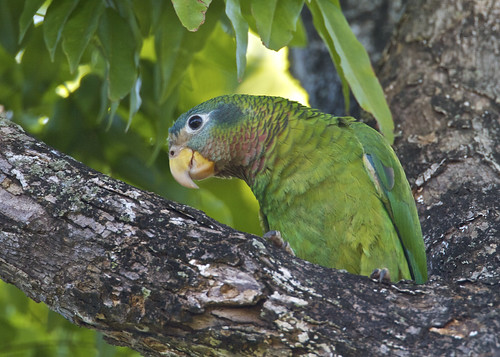 Yellow-Billed Parrot (Amazona Collaria) Photo: Lee HunterThe National Environment and Planning Agency (NEPA) is reminding the public that it is illegal to buy and/or sell Jamaican parrots locally or trade in them internationally.
Yellow-Billed Parrot (Amazona Collaria) Photo: Lee HunterThe National Environment and Planning Agency (NEPA) is reminding the public that it is illegal to buy and/or sell Jamaican parrots locally or trade in them internationally.
"The Yellow-billed Parrot (Amazona collaria) and Black-billed Parrot (Amazona agilis) are protected under the Wild Life Protection Act as well as the Endangered Species (Protection, Conservation and Regulation of Trade) Act," the agency said in a release to the media.
Anyone found in possession of a live Jamaican parrot or any parts of it can be fined up to $100,000 or serve 12 months in prison under the Wild Life Protection Act. He/she can be fined up to $2,000,000 and/or be sentenced to two years in prison if caught trading in or exporting these birds without a permit under the Endangered Species Act.
"Jamaica's parrots are very important to the environment. They feed on fruits and disperse the seeds over large areas, contributing to forest regeneration. They are also important to our natural heritage as they are endemic to the island, that is, they are found only in Jamaica," the environmental regulatory agency noted.
The island's parrots are threatened with extinction and therefore need to be protected. They are listed on the World Conservation Union Red List of Threatened Species. The main threats to the parrots are loss of habitat due to deforestation, and poaching for sale as pets.
"Persons who purchase Jamaican parrots contribute directly to the decline of the species as the poachers not only reduce the numbers for future generations but often cut down the nest tree to capture the young birds, thus reducing the availability of nesting sites. This is very critical as Jamaican parrots do not excavate nest holes, but instead modify existing holes in old rotting trees to form nests," said NEPA.
The population sizes of the two Jamaican parrots are very small and the nesting sites are limited. The public is being urged to contact NEPA at 754-7540 or 1 888 991 5005 to report any poaching or sale of parrots as we strive to conserve these threatened species.